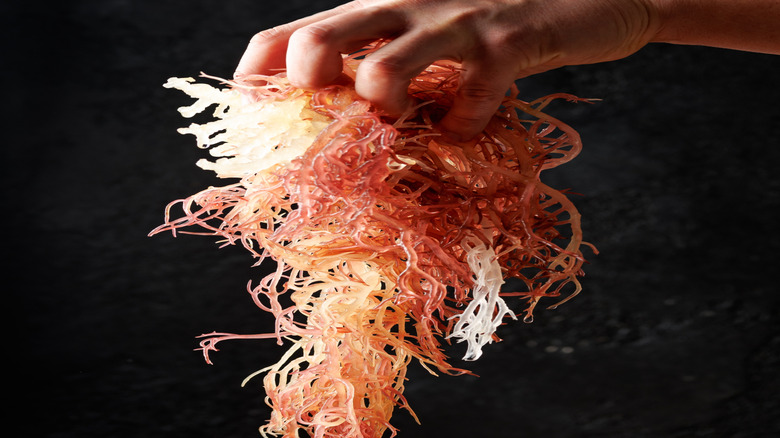
When your parents told you to “Eat your vegetables,” you might have imagined those typically grown in the soil, like potatoes, carrots, and beans. However, some vegetables thrive in seawater, including one that has been promising for its cardioprotective, anticancer, and anti-diabetic properties.
Often referred to as Irish moss or red seaweed, sea moss has a reddish hue and originates from Northern Atlantic waters. You’ve likely consumed one of its derivatives, a fiber known as carrageenan, as it’s commonly used as a natural thickening agent. Alternatively, you might have tried sea moss if you’re among the 36% of people who regularly consume seaweed, as noted by a Maine Aquaculture Innovation Center survey.
Sea moss is packed with nutrients, such as calcium, iron, magnesium, and phosphorus. Many of these nutrients offer potential benefits for individuals dealing with high cholesterol, managing blood sugar levels, or aiming to reduce the risk of cancer.
Fight cholesterol building with fiber

Many studies highlighting the potential benefits of sea moss consumption have been conducted on different types of seaweed (or various kinds). However, since sea moss is a form of seaweed, studying any seaweed under strict scientific conditions is a reasonable way to assess this food’s health benefits.
Let’s talk about fiber. Though sea moss contains only 0.13 grams per two tablespoons, it is still considered “a good source of fiber,” as registered dietitian Bree Phillips noted in The Strategist. According to the American Society for Nutrition, only 5% of people in the United States achieve the recommended daily fiber intake. Therefore, incorporating sea moss into your diet can help you reach your daily fiber goals.
Among the potential benefits of a fiber-rich diet: lower cholesterol levels. In a 2003 study published in the Asia Pacific Journal of Clinical Nutrition, participants who consumed carrageenan showed a decrease in total cholesterol levels and an increase in “good” high-density lipoprotein (HDL) cholesterol levels.
Potential for blood sugar management and cancer prevention

Regarding promoting healthier blood sugar levels, seaweed showed promise as a diabetic-friendly food in a 2008 study published in Nutrition Research and Practice. Researchers found that consuming 48 grams of seaweed daily made it easier for participants to control glucose responses, alongside increases in their HDL cholesterol levels.
Furthermore, the link between sea moss and cancer reduction is attributed to its antioxidants, which help the body combat oxidative stress damage. A 2021 study in Carbohydrate Polymers concluded that, in laboratory settings, sea moss’s antioxidants might inhibit the growth of certain cancer cells in test tube experiments. While this is not conclusive evidence that sea moss prevents cancer, it suggests its anticancer potential.
This doesn’t imply that you should substitute sea moss for professional healthcare advice. The best strategy to address high cholesterol, pre-diabetes, diabetes, and cancer is consulting with a medical expert. However, if you’re looking to enhance your diet with functional foods, considering what sea moss can offer might be beneficial. Just be cautious, as like all sea plants, sea moss can absorb aquatic toxins such as metals. Additionally, those with inflammatory bowel syndrome should be careful when consuming carrageenan.




